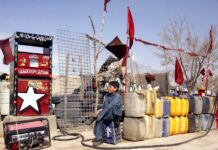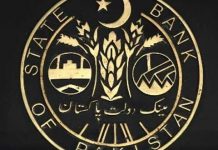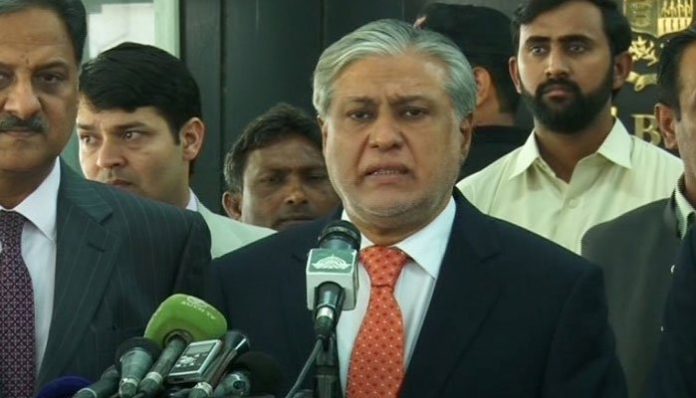ISLAMABAD: Finance Minister Senator Ishaq Dar has taken heavy loans worth more than Rs 800 billion from the banks to run the country’s economy surprisingly without the knowledge of the cabinet or the parliament, it was learnt.
Sources well-aware of the mounting burden of loans on country’s economy said that federal cabinet has so far been never briefed about the details of foreign loans obtained during last four years tenure of PML-N government. Surprisingly, the finance ministry was used to obtain the loans from commercial banks without conducting the bidding process and also without the knowledge of cabinet or parliament, though these were regularised, later on, said sources.
They also said that total foreign loans without the knowledge of the parliament or the cabinet are around $ 83 billion and government’s domestic debt increased to Rs 15.4 trillion by end of July 2017. Similarly, foreign loans alone stand at a point where the country needs almost $ 8.2 billion a year to pay back. Almost 20 per cent of Pakistan’s national budget will go to pay back loans. And, if the loans go above $ 100 billion, which will be almost 32 per cent of the GDP, the repayment cost might cross $ 12 billion a year while a developing country with a loan of $ 100 billion will have no choice but to declare bankruptcy, sources said.
“No finance minister in the history of this world has ever kept the loan agreements hidden from its cabinet or the Parliament. Even, not a single example of such a thing is available in the past 100 years of financial matters of the nation-states around the globe,” said sources.
Sharing details of loans, the sources further said that heavy loan worth $ 2 billion was obtained from the foreign banks without the knowledge of the cabinet or the parliament, while $ 275 million from the Citi Bank, $ 700 million from the Standard Chartered, $ 650 million from the Credit Suisse, $ 40 million from ECO Trade And Development Bank and $ 55 million from Dubai Islamic Bank etc. By keeping the figures and agreements of loans secret from the cabinet and its members and also from the Parliament is the violation of the Rules of Business, 1973, they opined.
It was also learnt that following the instructions made by incumbent Prime Minister Shahid Khaqan Abbasi during last federal cabinet regarding the burden of increasing foreign loans on country’s economy, the finance ministry has prepared a presentation to be presented at the next cabinet meeting. The finance ministry will share details of $ 35 billion worth foreign loans obtained during last four years in the tenure of PML-N government and the rate of interest on such loans will also be discussed in the upcoming federal cabinet meeting. The finance ministry will also present a schedule for the payment of the loans obtained in the past.
Copies of official documents available with Pakistan Today transpired that total net domestic debt on December 31, 2016, was Rs 12,310.1 billion, while foreign debt was Rs 6,063.6 billion and Rs 18,373.7 billion was the net public debt.
Year-wise loans taken by the government from the State Bank of Pakistan since January 1, 2013, to March 2017 disclosed that the incumbent regime has totally borrowed above Rs 22042.2 billion in an apparent bid to improve the economy of the country.
During January to June 2013, the government borrowed Rs 2274.7 billion, while Rs 5925.4 billion from July 2013 to June 2014, Rs 5210.6 billion from July 2014 to June 2015, Rs 4294.3 billion from July 2015 to June 2016 and Rs 4337.2 billion from July 2016 to March 2017 from the SBP, said a copy of the official documents.
Similarly, the foreign debt of Pakistan on June 30, 2013, was Rs 4,796.5 billion, while Rs 4,071.5 billion on June 30, 2014, and Rs 5,181.8 billion on June 30, 2015. Also, the foreign debt stood at Rs 6,051.1 billion on June 30, 2016.
According to the breakup of the net domestic and public debts, the net domestic debt on June 30, 2013, was at Rs 8,686.2 billion, while Rs 9,551.3 billion on June 30, 2014, and Rs 10,804.8 billion on June 30, 2015. The net domestic debt was at Rs 11,773.5 billion on June 30, 2016. Moreover, the net public debt was Rs 13,482.7 billion on June 30, 2013, while Rs 14,622.8 billion on June 30, 2014, and Rs 15,986.6 billion on June 30, 2015. Also, the net public debt was Rs 17,824.6 billion on June 30, 2016.
It is worth mentioning that the government of former Prime Minister Nawaz Sharif had obtained a whopping $ 35 billion in new loans during his four-year tenure to repay maturing debt and keep official foreign currency reserves at a level which could give a sense of economic stability to investors. About $ 17 billion or nearly half of the total loans obtained from July 2013 to June 2017 were utilised to repay the previous debt. The government added a net $ 18 billion to the country’s total external debt and liabilities, the highest amount added by any government during its tenure. More, since 2008-09, Pakistan has added $ 43 billion in external debt, which was more than half of the external debt and liabilities that have been added since independence. Besides, the PML-N took these loans to re-fix the economy and bring macroeconomic stability. Despite tall claims of the government, heavy loans have ostensibly caused an additional burden on the economy and to some extent have turned the future of Pakistanis bleak by acquiring record high loans running into over a trillion rupees. More, the mounting burden of loans is likely to become a major election issue as all the political forces of the country are criticising the PNL-N government which borrowed a heavy amount of money during its four-year tenure that surpassed the loans taken during the last 60 years.
Though ministry of finance is continuously denying it, the debt burden on Pakistan has hit menacing levels, however, concerns over sky-high debt have seen a rise in civil-military tensions, with the army chief also expressing worries over the economic situation last week.























